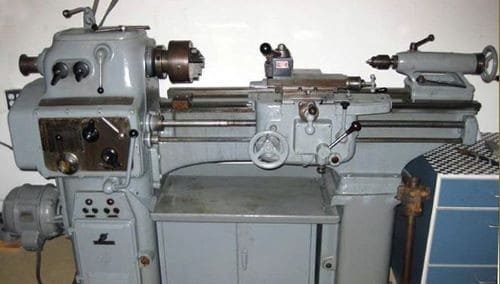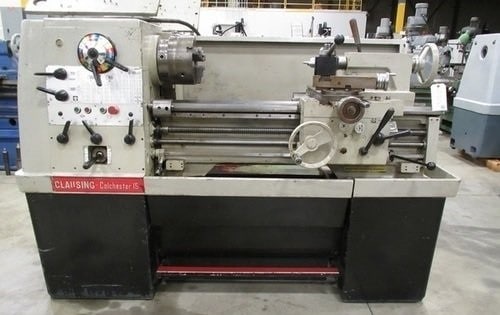If you’ve ever wondered, “Does a metal lathe weigh a lot?”, you’re in the right place. Well, let’s dive right into it!
Metal lathes do tend to be on the heavier side, but how heavy exactly? Stay tuned!
You’re about to find out everything you need to know about the weight of metal lathes. So, let’s get started!

Does a Metal Lathe Weigh? Understanding the Weight of Metal Lathes
Metal lathes are essential tools used in various industries, especially in the field of machining. These machines are known for their precision and ability to shape metal pieces with great accuracy. However, one question that often arises among enthusiasts and professionals alike is, “Does a metal lathe weigh?” In this article, we will delve into this topic and explore the factors that contribute to the weight of metal lathes.
Factors Affecting the Weight of Metal Lathes
Metal lathes come in a variety of sizes and configurations, and their weight can vary significantly depending on several factors. First and foremost, the size of the lathe plays a crucial role in determining its weight. Smaller benchtop lathes typically weigh between 100 to 500 pounds (45 to 227 kilograms), while larger industrial lathes can weigh several tons.
Another factor that contributes to the weight of a metal lathe is the material used in its construction. Most metal lathes are made from heavy-duty cast iron, which adds to their overall weight. Cast iron is a durable and rigid material that helps dampen vibrations during the machining process, ensuring accurate results. Other components, such as the headstock, tailstock, and carriage, also contribute to the weight of the lathe.
Additionally, the accessories and attachments that come with the lathe can influence its weight. Features like a turret, toolpost, chuck, and coolant system can add significant weight to the machine. It’s important to consider these factors when determining the weight of a metal lathe, especially if you need to transport or install it in a specific location.
Transporting and Handling Heavy Metal Lathes: Tips and Considerations
Transporting and handling heavy metal lathes require careful planning and proper equipment to ensure the safety of both the machine and the personnel involved. Here are some tips and considerations to keep in mind:
1. Use proper lifting equipment: When moving a heavy metal lathe, it is crucial to use lifting equipment designed to handle the weight. This may include forklifts, cranes, or other specialized machinery. Always consult the manufacturer’s guidelines for recommended lifting capacities and techniques.
2. Secure the lathe during transport: To prevent damage to the lathe and ensure its stability, secure it properly during transportation. Use appropriate straps, braces, and padding to prevent any movement or vibration that may cause structural damage.
3. Plan the route and access points: Before transporting the lathe, assess the route and access points to ensure they can accommodate the size and weight of the machine. Measure doorways, hallways, and elevators to ensure a smooth and safe passage.
4. Seek professional assistance if needed: If you are unsure about how to properly handle or transport a heavy metal lathe, it is advisable to seek the assistance of professionals who specialize in industrial machinery moving. They have the experience, equipment, and expertise to ensure a smooth and hassle-free process.
Benefits of Heavy Metal Lathes
While the weight of a metal lathe may pose challenges during transportation and handling, heavy-duty lathes offer several benefits in terms of performance and precision. Here are some advantages of heavy metal lathes:
1. Stability and rigidity: Heavy lathes are less prone to vibrations, ensuring stable and precise machining. The weight of the lathe helps dampen vibrations caused by cutting forces, resulting in higher-quality finished products.
2. Durability: Heavy-duty lathes are designed to withstand the rigors of continuous use in industrial settings. The robust construction and high-quality materials used in their manufacturing make them highly durable and reliable.
3. Versatility: Heavy metal lathes often come with a range of features and accessories that enhance their versatility. From multiple spindle speeds to toolpost options, these lathes offer flexibility to handle a wide variety of machining tasks.
4. Longevity: Investing in a heavy metal lathe ensures long-term durability and performance. These machines are built to last, making them a wise investment for industrial workshops and manufacturing facilities.
In conclusion, the weight of a metal lathe is determined by factors such as its size, construction materials, and accessories. While transporting and handling heavy lathes may require additional effort and proper equipment, the benefits they offer in terms of stability, durability, versatility, and longevity make them indispensable tools in the machining industry. So the next time you wonder, “Does a metal lathe weigh?” remember that the weight is an essential aspect of their design and functionality.
Key Takeaways: How much does a metal lathe weigh?
- A metal lathe can weigh anywhere from a few hundred pounds to several thousand pounds.
- The weight of a metal lathe depends on its size and capacity.
- Small benchtop metal lathes typically weigh around 100 to 400 pounds.
- Larger industrial metal lathes can weigh upwards of 5,000 pounds or more.
- It is important to consider the weight of a metal lathe when transporting or installing it.
Frequently Asked Questions
Here are some common questions about the weight of metal lathes:
1. How much does a metal lathe generally weigh?
The weight of a metal lathe can vary depending on its size and capacity. On average, a small to medium-sized metal lathe can weigh between 200 and 500 pounds. Larger industrial-grade metal lathes can weigh several thousand pounds. It’s important to consider the weight and ensure that you have the appropriate equipment and space to handle it.
Keep in mind that the weight mentioned refers to the actual weight of the lathe itself, without any additional accessories or attachments. These may add some extra weight to the overall setup.
2. Why are metal lathes so heavy?
Metal lathes are designed to handle heavy-duty machining operations and work with metal materials. The weight of a metal lathe ensures stability and minimizes vibrations during operation, which is crucial for achieving accurate and precise machining results. The solid and robust construction of a metal lathe contributes to its weight, as it needs to withstand the forces generated during machining processes.
Additionally, the weight of a metal lathe is also influenced by the materials used in its construction. Heavy-duty cast iron or steel components are often used to provide strength and durability.
3. Can a metal lathe be moved easily?
Moving a metal lathe can be challenging due to its weight and size. It requires proper planning and equipment to ensure a safe and smooth relocation. Depending on the size and weight of the lathe, you may need a forklift, pallet jack, or a group of people to assist with the move.
If you need to move a metal lathe frequently, consider investing in a lathe with built-in mobility features, such as wheels or a portable stand. These can make it easier to transport the lathe within a workshop or between different locations.
4. What should I consider when setting up a metal lathe due to its weight?
When setting up a metal lathe, it’s important to ensure a stable and level foundation to handle its weight. A solid workbench or heavy-duty lathe stand is typically used to support the lathe. It’s also crucial to anchor the lathe securely to prevent any unwanted movement during operation.
Consider the floor space and any weight restrictions in your workshop or working area. Consult the lathe’s manual or manufacturer guidelines for specific recommendations on setup, including any additional vibration-dampening measures or anchoring requirements.
5. Can the weight of a metal lathe affect its performance?
The weight of a metal lathe itself does not directly affect its performance. However, the weight plays a role in the lathe’s stability and vibration resistance, which can have an impact on machining accuracy and surface finishes. A heavier lathe tends to provide more stability during cutting operations, resulting in improved precision and smoother finishes.
It’s important to note that factors such as the lathe’s design, construction quality, and proper maintenance also contribute to its overall performance. Weight alone should not be the sole determining factor when considering the performance of a metal lathe.

Every shop needs a metal lathe.
Summary
So, to sum it up for you: the weight of a metal lathe depends on its size and features. Generally, smaller lathes weigh around 800 to 2,500 pounds, while larger ones can go up to 10,000 pounds or more. Remember, these weights are just estimates, and it’s best to check the specifications of the specific lathe you are interested in. Moreover, when purchasing a lathe, it’s important to consider its weight to ensure that your workspace can support it and to plan for the necessary transportation arrangements.
source https://thehabitofwoodworking.com/2023/does-metal-lathe-weigh/

No comments:
Post a Comment